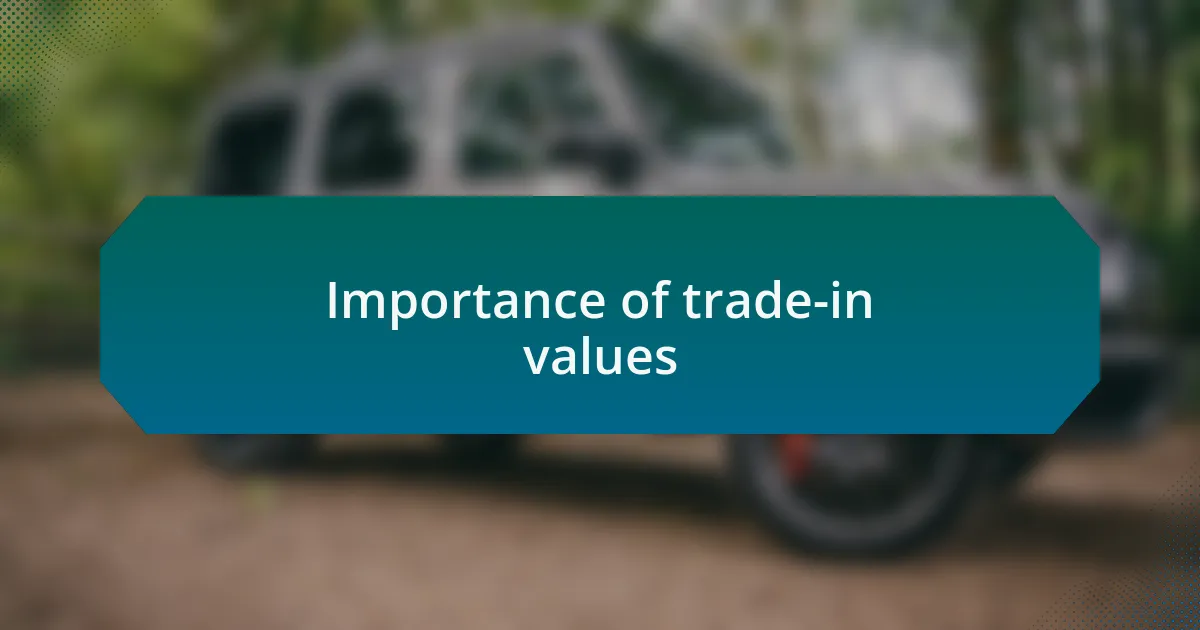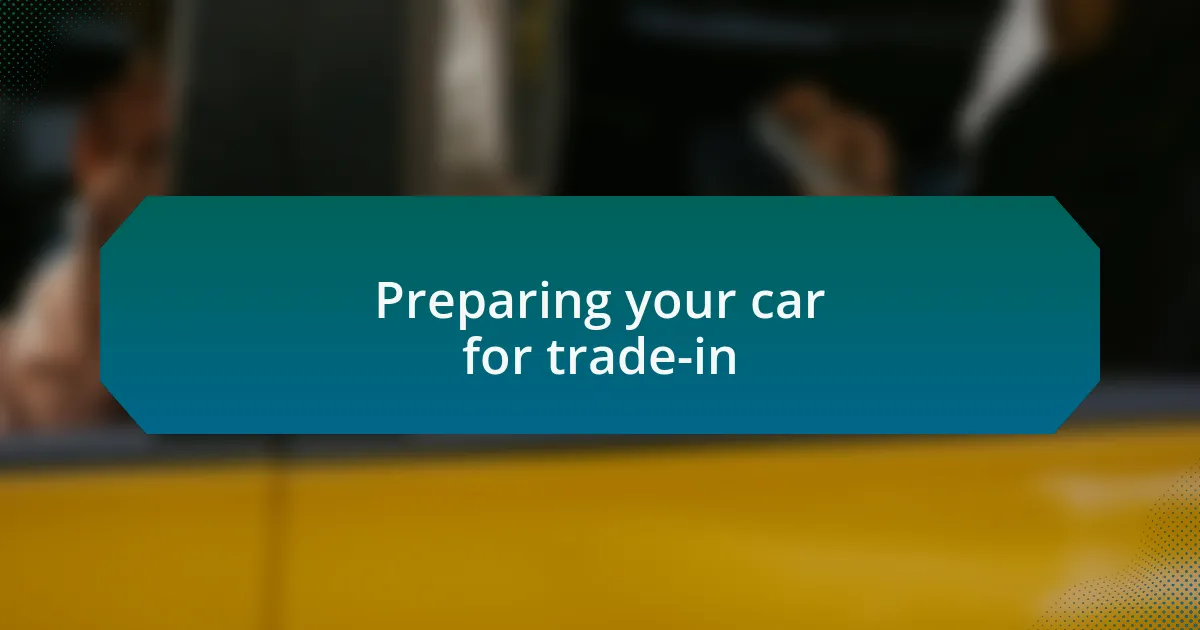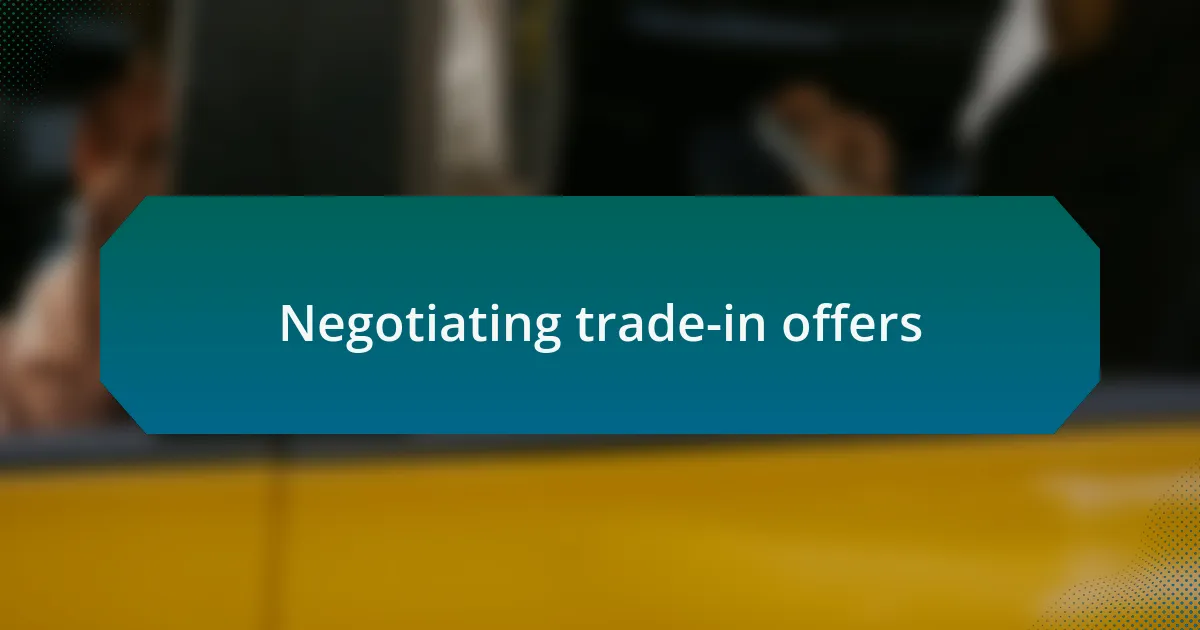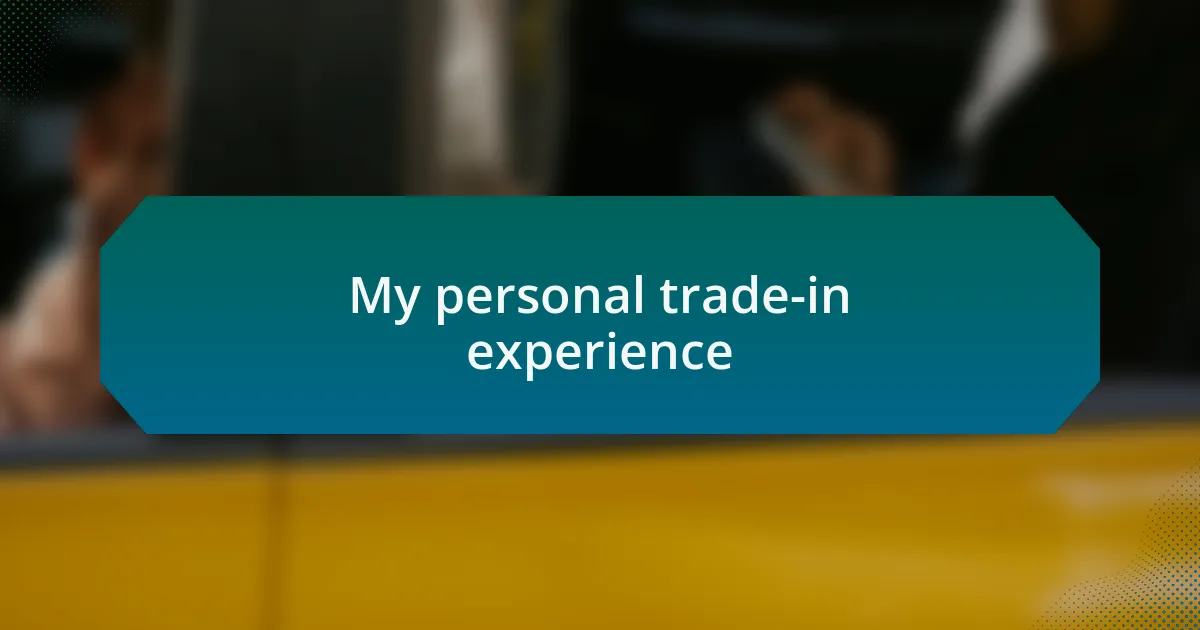Key takeaways:
- Luxury car sales intertwine emotion and aspiration, making the buying experience deeply personal.
- Understanding and maximizing trade-in values can significantly enhance the appeal and financial outcome of luxury vehicle transactions.
- Preparing a car for trade-in—through cleaning, repairs, and documentation—can lead to better offers.
- Building personal connections with dealership staff can improve the trade-in experience and create a more enjoyable atmosphere.

Understanding luxury car sales
Luxury car sales represent more than just a transaction; they’re a complex blend of emotion, status, and aspiration. I remember my own experience stepping into a dealership, feeling both excitement and nervousness. It’s not just about the car; it’s about the dream that comes with it—an extension of one’s identity and success.
In these sales, the buyer’s motivation often intertwines with personal milestones. Perhaps it’s a reward for years of hard work or a symbol of a new beginning. Have you ever found yourself yearning for something that signifies achievement? That’s the essence of luxury car ownership. I’ve seen clients light up when test-driving a car they’ve long admired, and in that moment, it’s clear that the sale is more than financial—it’s deeply personal.
Understanding luxury car sales also means recognizing the importance of customer experience. It’s not just a showroom; it’s a sanctuary where aspirations meet reality. Each interaction can make or break a potential sale, and I’ve seen how attentive service transforms a mere inquiry into a lifelong relationship with the brand. Isn’t it fascinating how such a significant purchase can hinge on the warmth of a salesperson’s approach?

Importance of trade-in values
In the luxury car market, understanding trade-in values is crucial for buyers and sellers alike. I recall a moment when a friend traded in their aging sports car; they were pleasantly surprised by the value it held. This experience taught me that a well-timed trade-in can significantly offset the purchase price of a new luxury vehicle, making the dream car feel much more attainable.
The emotional weight of a trade-in often goes beyond its financial aspect. When I visited a dealership, I noticed a customer feeling hesitant about letting go of their vehicle, a car that had been a part of countless memorable road trips. This connection highlights how trade-in values create a unique opportunity for sellers to not only gain financial benefits but also transition smoothly into their new luxury experience, fostering a sense of continuity in their automotive journey.
Additionally, being aware of trade-in values can empower buyers during negotiations. I remember negotiating for my own luxury vehicle and feeling confident as I walked in, knowing the market value of my trade-in. This knowledge provided leverage and made the entire process less intimidating. Have you ever entered a negotiation feeling prepared? It’s a game changer, ensuring you get the best deal possible while trading up to your next luxury ride.

Assessing your luxury car
Assessing your luxury car involves more than just checking its maintenance records. I recall standing in my garage, contemplating the condition of my vintage convertible. The decision to trade it in wasn’t strictly financial; I had to weigh its emotional significance against its current market appeal. A thorough assessment revealed hidden features that added value, reminding me that the sentimental attachment can sometimes cloud practical judgment.
Next, it’s essential to consider how the car’s condition affects its value. When I decided to trade in my luxury SUV, I was shocked at how much the small dents and scratches—accumulated during my weekend adventures—dropped its worth. Reflecting on this, I learned how necessary it is to keep your vehicle in pristine condition not only for personal pride but for maximizing its trade-in value. Have you considered what minor repairs or detailing could do for your car’s perceived worth?
Lastly, evaluating market trends can make a substantial difference in your assessment process. I remember following the luxury sedan market for a few months, and the sudden peak in demand helped me realize the potential trade-in value of my vehicle. Staying informed can not only provide insights into when to sell but also highlight specific features that buyers are currently looking for. Does it make you reconsider your own vehicle’s selling potential?

Preparing your car for trade-in
Preparing your luxury car for trade-in is a critical step that I learned the hard way. When I was ready to let go of my sleek coupe, I took the time to clean and detail it inside and out. It was surprising how much a thorough washing and waxing transformed its appearance, boosting my confidence that I’d get a better offer. Have you ever wondered about the impact of first impressions when it comes to selling your car?
Next, I found that addressing minor repairs can significantly increase your vehicle’s appeal. I recall fixing a few stubborn scratches and replacing some worn-out floor mats shortly before I traded in my sports car. These small investments paid off; the dealer noticed the effort and offered me a much higher price than I initially expected. It made me think—what little fixes could you tackle that might make a huge difference in your trade-in value?
Lastly, gathering all relevant documentation can make the trade-in process smoother and more rewarding. I remember compiling my maintenance records, registration, and any receipts for upgrades when I traded in my luxury sedan. This preparation showed potential buyers that I had taken excellent care of the vehicle, which ultimately led to a more favorable deal. Have you considered organizing your paperwork to give yourself an edge during negotiations?

Selecting the right dealership
Selecting the right dealership can significantly influence your trade-in experience. I still vividly remember the moment I walked into a dealership that just felt right. The staff greeted me warmly, and their willingness to share insights made me feel valued. How often do you find a place where the atmosphere lifts your confidence?
It’s crucial to research a dealership’s reputation before making your choice. I spent time reading reviews and talking to friends who had traded in their vehicles there. One dealership stood out not just for their competitive offers but for their transparent appraisal process. What emotions do you want to associate with your trade-in—trust or uncertainty?
I also learned the importance of personal connections at a dealership. During one of my visits, I connected with a salesperson who truly understood my luxury car’s worth. That rapport made discussions feel less transactional and more like a partnership. Have you considered how building that personal connection could impact your overall experience?

Negotiating trade-in offers
When it comes to negotiating trade-in offers, I always emphasize doing your homework first. Before heading to the dealership, I researched the market value of my luxury car. It was eye-opening to find out that I could expect a solid offer, which gave me the confidence to counter any low-ball initial bids. Have you ever felt that surge of empowerment when you’re armed with information?
During negotiations, I found that being open about my car’s condition made a significant difference. I recalled a previous experience where I shared the extensive service records and the meticulous care I’d given my vehicle. The dealer seemed to appreciate the transparency, and it fostered a more genuine discussion about the offer. Isn’t it amazing how honesty can transform a negotiation into a collaboration instead of a confrontation?
I’ve learned to approach trade-in negotiations as a conversation rather than a battle. At one dealership, instead of focusing solely on the numbers, I talked about the joy of owning my car and the unique features it offered. Rather than feeling like I was trying to win, I felt like I was sharing a story that mattered. Have you ever experimented with storytelling in negotiations? It might just change the dynamic entirely.

My personal trade-in experience
When I decided to trade in my luxury sedan, the process felt both thrilling and nerve-wracking. I recall standing in the dealership, heart racing, as I watched the salesperson inspect my car. Their expressions shifted from casual indifference to genuine interest when I mentioned the custom features I had added. Doesn’t it feel rewarding when you see someone appreciate the unique aspects of something you cherish?
As the appraiser took their time with the inspection, I felt a mix of anticipation and anxiety. I vividly remember the moment they returned with the offer; a whirlwind of emotions swept over me. To my surprise, it exceeded my expectations. I had prepared myself for a lower bid but was reminded that when you thoughtfully present your vehicle, it can resonate more deeply than mere numbers. Have you ever had one of those moments where you realize you underestimated the value of what you have?
Another key takeaway from my trade-in experience was how the atmosphere of the dealership influenced my comfort level. At a particular dealer, I felt a sense of camaraderie with the staff, which made discussing the trade-in more enjoyable. I shared my stories of road trips and memorable journeys, and I spotted a flicker of nostalgia in their eyes. It’s incredible how sharing personal stories can create connections, making an intimidating process feel like a friendly exchange instead.